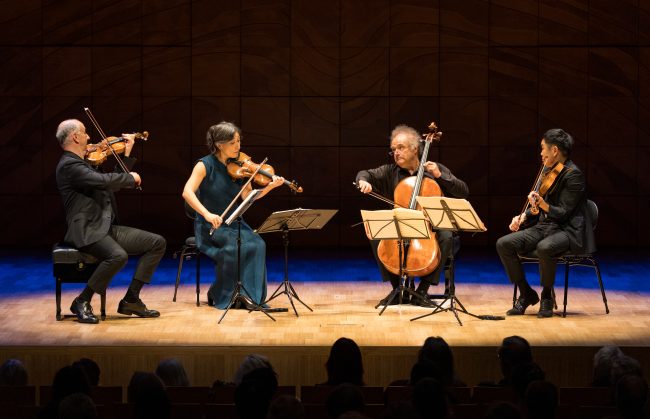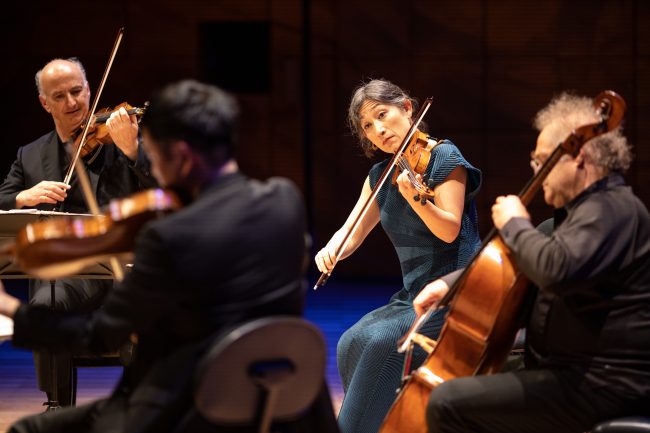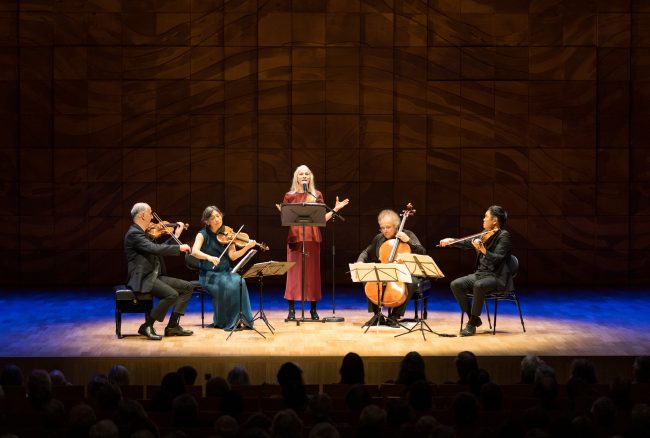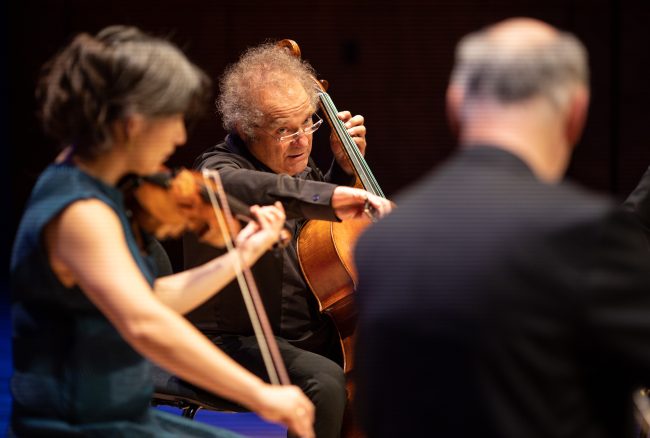Monday 18 August 2025
Review by Paul Neeson (Arts Wednesday)

Four strings. One mind.
It’s easy to see why the Takács Quartet is considered one of the pre-eminent string quartets on the planet and a regular guest of Music Viva Australia. An appreciative crowd gathered on a wet winter night at the City Recital Hall to witness precision playing, impeccable balance and exuberant musicianship in a program from masters of the genre plus a brand new Australian commission.
In 1975, four students at the Music Academy in Budapest founded the quartet before relocating to Boulder, Colorado. Not surprisingly after 50 years there has been several lineup changes, but one founding member remains – cellist András Fejér. They have won a Grammy Award and several awards for their extensive catalogue of recordings.

Franz Joseph Haydn composed his Op.74 No.3 Quartet, not for a royal court as was the case up till then, but for a paying public performance. While there are elements of popularism, the elegant sophistication of his writing still dominates. In a nod to the public audience, the nickname ‘The Rider’ (sometimes translated as ‘The Horseman”) was applied to the work, not by Haydn but most likely by a publicist. Nevertheless Haydn was happy to accept the sobriquet. The connection can be heard particularly in the final movement with a jaunty rhythm that resembles a gallop in places.

Sonnet of an Emigrant for narrator and string quartet is a new commission for Brisbane born composer Cathy Milliken. The narrator was Cathy’s sister and well-known actor Angie Milliken. She commanded a powerful presence on stage with her long blond hair and black dress delivering a moving performance. The text was inspired by the poetry of Bertholt Brecht. He had been forced to emigrate three times which makes him an expert on the subject: first when the Nazis came to power he fled to Scandinavia, then to the USA with the outbreak of war, and finally back to Berlin after being accused of being a communist in the McCarthy era.
The eight Brecht sonnets are full of unease and sadness, and the disturbing sense of never being able to settle, and this is reflected in the string writing. It is eery and unsettled and is cleverly crafted with the text in mind allowing pauses and space for the words to shine through the uncomfortable textures. I guess given the subject matter I was expecting some anger and bitterness, but upon reflection that was not what Brecht was expressing, it was more melancholy and nostalgia, and Milliken treads that path with expertise.

Beethoven’s 3rd Razumovsky Quartet rounded out the program. The writing in this quartet is fiendishly difficult but consummately managed by the Takács players. The Andante con moto movement was more like a sonata for cello with strings as the cello part consisted of either a pizzicato bass line or a dominant melody, with the three upper strings providing not much more than harmonic texture. And András Fejér seemed to be in his happy place performing this movement. At nearly 70, I was wondering whether this tour may be his swan song. Certainly no announcement has been made to date. And of course Ludwig van can be relied on for a rousing final moment to set the crowd alight. The speed and accuracy of the semiquavers was electrifying, but the balance between the parts was never compromised, with every dominant phrase being given the perfect amount of emphasis and space.
1st violinist, Edward Dusinberre acknowledged as much when he announced the encore, saying it had to be something with less notes. The regular Music Viva crowd emitted a collective sigh when he introduced the 2nd movement of Ravel’s String Quartet, you know the famous pizzicato movement. We all went out into the rainy night happy, while the Takács Quartet went off to continue their national tour.
You can listen to a recent interview with 2nd violinist Harumi Rhodes below: